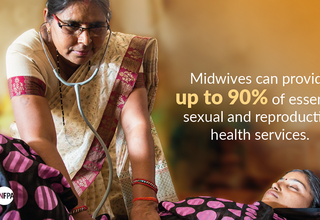Stung Treng, Cambodia: When Hang Dèng, aged 16 arrived at the provincial referral hospital her feet, hands, and face were very swollen, she was experiencing convulsions, and her unborn baby was showing signs of foetal distress. Hang Dèng had travelled a long way with her husband and mother to reach the hospital, which was a 1 hour journey from her remote village to the health centre by boat and a further 3 hours to reach the hospital by ambulance.
Due to the severity of her condition, she was referred from the rural health centre to the provincial referral hospital in Stung Treng Province, north eastern Cambodia.
It was almost midnight when the ambulance arrived at the hospital. A shirtless and barefooted young man, Hang Dèng's husband, Nan Sokhom, aged 21, jumped out of the ambulance with a pale and distressed look on his face and rushed toward a the midwives who were waiting and ready to save Hang Dèng.
With the help of the midwives, Hang Dèng, who was having fits, was prepared to deliver her first child at the hospital. Her condition was so critical that doctors decided to do an emergency caesarean section to save the life of her baby and her.
Dèng and her baby could have died if there was a further delay in her referral to the hospital. Ms. Un No, 39 years old, the mother of Hang Dèng, sadly murmurs as she is waiting outside the operation room, "our family did not have enough money to prepare for the delivery so when Hang Dèng went into a long labour we left it until it was almost too late."
Cambodia still has one of the highest maternal mortality ratios in the region. Each year about 150 women lose their lives during child bearing. The causes of maternal death are preventable particularly when a woman is well-informed about pregnancy related complications and warning signs, is prepared and able to seek medical assistance for safe delivery, and can access and receive quality services on time. In 2008, UNFPA supported the first National Emergency Obstetric and Newborn Care Assessment and found that only 12.7% of women who develop obstetric complications were treated in an EmONC facility. The vast majority of facilities require significant upgrades.
In 2012, UNFPA donated two ambulances to remote health centres to transport women with complicated pregnancies to referral hospitals to ensure that deliveries are attended by a skilled professional with appropriate equipment and facilities.
Now, Hang Dèng's family is happy to see that her baby is healthy and doing well. Dèng is extremely thankful to the midwives, because without them both her and her baby would not have survived. "We are so lucky and blessed to have come to the referral hospital. The midwives took good care of my wife and baby", said Sokhom, Dèng's husband, while holding his newborn as she breastfeeds. As a final word, the young couple shyly say that they would like to have their next baby in 5 to 10 years and Dèng will use a modern contraceptive method to assist with their family planning and plans for the future.


